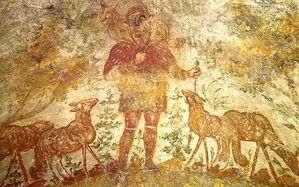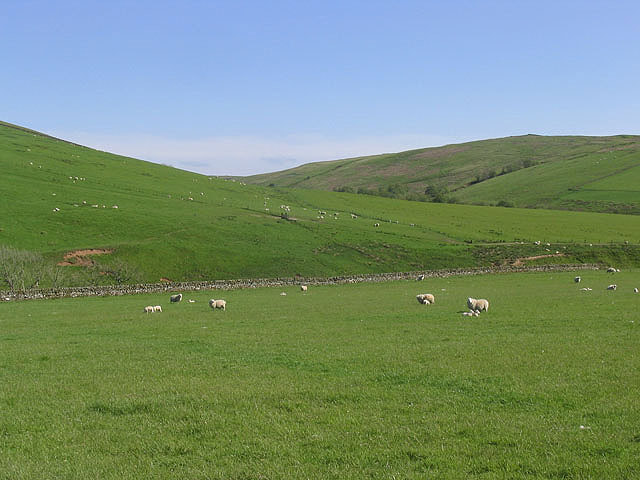 Image by Sven Lachmann from Pixabay Image by Sven Lachmann from Pixabay Off into the Baroque on a path less traveled by. A pastorale is a music form intended to convey nature—the pastures of shepherds and their flock. Though often associated with the Christmas season, we hear at the Prelude a sectional work in this style by Italian composer Domenico Zipoli (1688-1726.) Zipoli interestingly became a Jesuit missionary who spent his final years teaching and composing among the Guarani people in Peru. The Musical Offering brings us to the French Baroque with the dance-like "Gavotte" by Jean-Philippe Rameau (1683-1764). A leading music theorist and composer for opera and harpsichord, this fanciful work for violin and keyboard is an excerpt from his 1745 opera-ballet, "Le Temple de la Gloire" (The Temple of Glory). Violinist Harmony Tucker joins. Sending us out into the world is a Postlude technically not from the 18th century but composed in that idiom with faithful accuracy. Based on the German Easter hymn "Erschienen ist der herrlich Tag" (Appeared is the Splendid Day), this 19th century setting by Austrian composer Heinrich von Herzogenberg (1843-1900) employs common Baroque compositional techniques such as canon, imitation, and the use of the cantus firmus (i.e. the hymn tune) in the pedal. As a devotee and champion of J.S. Bach's music, the Master's influence is easily felt throughout this chorale prelude. At the 6:00 p.m. service, bassist Peter Strening and cantor Blair Carpenter lead songs of the Good Shepherd and offer sounds of jazz and an inadvertent song of the Easter season by the band Coldplay.
0 Comments
 Public Domain, https://commons.wikimedia.org/w/index.php?curid=508911 Public Domain, https://commons.wikimedia.org/w/index.php?curid=508911 Sounds of spring. Words of comfort from the Good Shepherd through the ages. Two chorale preludes and a bit of Vivaldi. The Irish tune Saint Columba is often associated with the hymn text "The King of Love My Shepherd Is," a lovely paraphrase of Psalm 23 by Henry Baker (1868.) The tune receives a florid interpretation by British composer Robin Milford during the prelude. Interestingly, this setting was also adapted for an orchestral version in an episode of the original Star Trek series. The postlude is an energetic and joyous Toccata on the Easter hymn "Come, Ye Faithful, Raise the Strain" (tune: Gaudeamus Pariter) from James Biery's collection Three for Easter. The musical offering is movement one from the "Spring" portion of Antonio Vivaldi's infamous concerto Four Seasons. Violinist Harmony Tucker joins us for this well-known excerpt here in the heart of springtime. This Sunday's music is inspired by the bucolic setting of Psalm 23. The Fourth Sunday of Easter is sometimes known as "Good Shepherd Sunday" for the traditionally prescribed reading of this famous psalm and its message of assurance and comfort. And it does appear the local weather will cooperate offering us a nice backdrop during the services...
"Pastorale" by British organist and composer Alec Rowley opens the morning services. A pastorale is a traditional music form, usually in a compound triple meter, meant to evoke nature: a pastoral scene. The apt "Toccata for a Joyful Day" by eminent American composer Emma Lou Diemer sends us out on an exciting and jubilant note at the 11:00 a.m. service. This Sunday is also the last of the season for Plymouth's hand bell choirs. At 9:00 a.m., the Youth Bells will ring a setting of "Here I Am, Lord" by Arnold Sherman during communion and "A Time for Joy" by Cynthia Dobrinski at the postlude. The Plymouth Ringers offer "All Things Bright and Beautiful" by Susan Geschke at the 11:00 a.m. service. Also at 11:00, the Chancel Choir sings a beautiful setting of Psalm 23 by composer and virtuoso vocalist Bobby McFerrin. The composition is dedicated to the memory of his mother, who also was an accomplished singer. Sara Copper had served as a Metropolitan Opera judge and chaired the vocal department at Fullerton College in California. McFerrin's psalm paraphrase incorporates an abundance of feminine imagery. At 6:00 p.m., Bobby and Blair are joined by harpist Alaina Bongers and flutist Rebecca Quillen for further explorations of bucolic imagery in Celtic musical offerings and an arrangement of Mack Wilberg's choral setting "My Shepherd Will Supply My Need." |
Details
|


 RSS Feed
RSS Feed